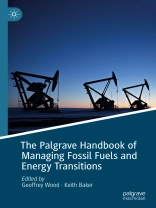This Handbook is the first volume to comprehensively analyse and problem-solve how to manage the decline of fossil fuels as the world tackles climate change and shifts towards a low-carbon energy transition. The overall findings are straight-forward and unsurprising: although fossil fuels have powered the industrialisation of many nations and improved the lives of hundreds of millions of people, another century dominated by fossil fuels would be disastrous. Fossil fuels and associated greenhouse gas emissions must be reduced to a level that avoids rising temperatures and rising risks in support of a just and sustainable energy transition.
Divided into four sections and 25 contributions from global leading experts, the chapters span a wide range of energy technologies and sources including fossil fuels, carbon mitigation options, renewables, low carbon energy, energy storage, electric vehicles and energy sectors (electricity, heat and transport).They cover varied legal jurisdictions and multiple governance approaches encompassing multi- and inter-disciplinary technological, environmental, social, economic, political, legal and policy perspectives with timely case studies from Africa, Asia, Australia, Europe, North America, South America and the Pacific.
Providing an insightful contribution to the literature and a much-needed synthesis of the field as a whole, this book will have great appeal to decision makers, practitioners, students and scholars in the field of energy transition studies seeking a comprehensive understanding of the opportunities and challenges in managing the decline of fossil fuels.
विषयसूची
Part I: INTRODUCTION.- 1 Fossil Fuels in a Carbon-Constrained World; Geoffrey Wood.- 2 Carbon Capture and Renewables: Strategic Conflicts or Tactical; David Elliott.- 3 The Long Goodbye to the Nuclear Monument; Paul Dorfman.- 4 The Impact of Intermittent Renewables on Conventional Thermal Generation: The Role of Capacity Remuneration Mechanisms in European Electricity Markets; Taner Şahin.- PART II: MANAGING THE DECLINE OF FOSSIL FUELS.- 5 China’s Efforts to Constrain its Fossil Fuel Consumption; Philip Andrews-Speed.- 6 Managing the Decline of Fossil Fuels in a Fossil Fuel Intensive Economy: the Case of the Netherlands; Sem Oxenaar and Rick Bosman.- 7 Fossil Fuels and Transitions: The UK MER Strategy and Low Carbon Energy Transitions; Gokce Mete, Wairimu Karanja and Nduta Njenga.- 8 Enacted Inertia: Australian Fossil Fuel Incumbents’ Strategies to Undermine Challengers; Marc Hudson.- 9 Buffeted or Energised? India’s Dynamic Energy Transition; Daniel Gilbert and Pooja Chatterjee.- 10 Latin America: Using the Leverage of Fossil Fuels to Power Renewable Energy in the Developing World; Juan Felipe Neira Castro and Geoffrey Wood.- 11 Transitioning to a Low Carbon Economy: Is Africa Ready to Bid Farewell to Fossil Fuels?; Victoria Nalule.- 12 The Role of German Trade Unions in the Energy Transition: Agency and Power; Stefan Bößner.- 13 Fossil Fuel Decline and the Rural Economy: The Case of Scotland; Bill Slee.- PART III: TOWARDS A NEW AGENDA?.- 14 The Long Hello: Energy Governance, Public Participation and ‘Fracking’; John Whitton and Ioan Charnley-Parry.- 15 Ban Or Regulate? Critical Junctures in New York’s Fossil Fuel Regulation; Ida Dokk Smith.- 16 Regulation and Market reform: The essential foundations for a renewable future; Iain Wright.- 17 Prolonging Fossil Fuels or Hastening the Low-Carbon Transition? The Diffusion of Biofuel Development: Motivations and Strategies; Jale Tosun and Trevelyan S. Wing.- 18 Re-making the future: Transition movements and dismantling the environment-economy dichotomy; Cassandra Star.- 19 Is Energy Justice in the Fossil Fuel Industry a Paradox?; Tedd Moya Mose and Mohammad Hazrati.- 20 Fossil Fuel Welfare versus the Climate; Alex Lenferna.- 21 Perspectives on an energy system after a decline in fossil fuel use: Welcome to the Store-Age; Andrew Crossland.- 22 Decarbonising Heat in Scotland – The Perfect Storm Revisited; Keith Baker.- PART V: EPILOGUE.- 23 Managing the Decline of Fossil Fuels: A Long Goodbye?; Geoffrey Wood.- 24 Our Time is Up; Keith Baker and Geoffrey Wood.
लेखक के बारे में
Geoffrey Wood is a teaching fellow in International Energy Law and Policy at Stirling University Law School, UK. Actively involved in research specialising in energy, multi-level governance and energy transitions, he has published over 40 articles, books, chapters and other publications. Geoff has previously held research, lecturing and consultancy positions at Dundee University, the Scottish Government and the Offshore Renewables Institute.
Keith Baker is a researcher in Fuel Poverty and Energy Policy at the Built Environment Asset Management Centre, Glasgow Caledonian University, UK, Co-founder of the Energy Poverty Research initiative, and an active member of the Scottish ‘think and do’ tank, Common Weal.












